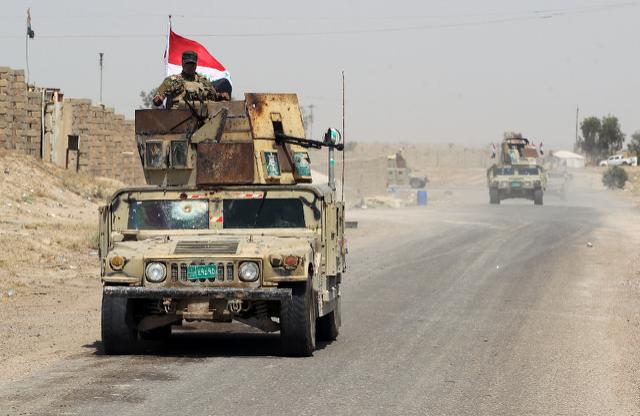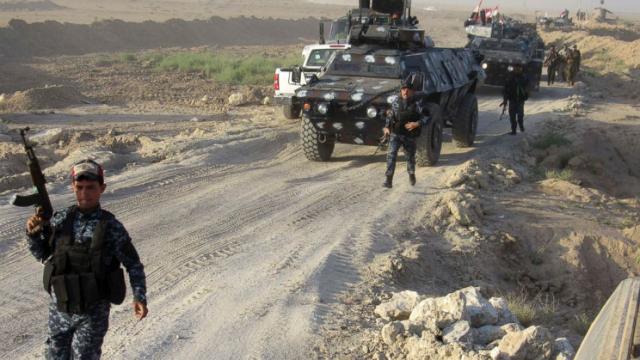
Baghdad (AFP) – Iraqi forces thrust into the city of Fallujah from three directions on Monday marking a new and perilous urban phase in the week-old operation to retake the jihadist bastion.
The drive to recapture the first city to be lost from government control in 2014 came as fighting also raged in neighbouring Syria, leaving huge numbers of civilians exposed.
Led by the elite counter-terrorism service (CTS), Iraq’s best trained and most seasoned fighting unit, the forces pushed into Fallujah before dawn, commanders said.
“Iraqi forces entered Fallujah under air cover from the international coalition, the Iraqi air force and army aviation, and supported by artillery and tanks,” said Lieutenant General Abdelwahab al-Saadi, the commander of the operation.
“There is resistance from Daesh,” he added, using an Arabic acronym for IS.
The forces have not yet ventured into the city centre but they recaptured some areas in a southern suburb after crossing a bridge, and took up positions on the eastern and northern fringes.
The involvement of the elite CTS marks the start of a phase of urban combat in a city where in 2004 US forces fought some of their toughest battles since the Vietnam War.
The week-old operation had previously focused on retaking rural areas around Fallujah, which lies just 50 kilometres (30 miles) west of Baghdad.
It had been led by the Hashed al-Shaabi paramilitary force, which is dominated by Tehran-backed Shiite militias.
They were still in action Monday, attempting to clear an area northwest of Fallujah called Saqlawiya, officers said.
– Civilians trapped inside –
Only a few hundred families have managed to slip out of the Fallujah area ahead of the assault on the city, with an estimated 50,000 civilians still trapped inside, sparking fears the jihadists could try to use them as human shields.
The only families who were able to flee so far lived in outlying areas, with the biggest wave of displaced reaching camps on Saturday night.
“Our resources in the camps are now very strained and with many more expected to flee we might not be able to provide enough drinking water for everyone,” said Nasr Muflahi, the Norwegian Refugee Council’s Iraq director.
“We expect bigger waves of displacement the fiercer the fighting gets.”
In Amriyat al-Fallujah, a government-controlled town to the south of the jihadist stronghold, civilians trickled in, starving and exhausted after walking through the countryside for hours at night, dodging IS surveillance.
“I just decided to risk everything. I was either going to save my children or die with my children,” said Ahmad Sabih, 40, who reached the NRC-run camp early on Sunday.
A senior police commander said his forces had assisted 800 civilians fleeing areas north of Fallujah on Monday.
Fallujah is one of just two major urban centres in Iraq still held by IS jihadists.
They also hold Mosul, the country’s second city and de-facto jihadist capital in Iraq, east of which Kurdish-led forces launched a fresh offensive on Sunday.
The jihadists holed up in Fallujah are believed to number around 1,000.
– Syria’s Aleppo bombarded –
It is not yet clear what resources IS is prepared to invest in the defence of Fallujah, which has been almost completely isolated for months, but the city looms large in modern jihadist mythology.
Fallujah is expected to give Iraqi forces one of their toughest battles yet but IS has appeared weakened in recent months and has been losing territory consistently in the past 12 months.
According to the government, the organisation that has sewn havoc across Iraq and Syria over the past two years now controls around 14 percent of the national territory, down from 40 percent in 2014.
However, as the “caliphate” it declared two years ago unravels, IS has been reverting to its old tactics of bombings against civilians and commando raids.
A fresh wave of bomb attacks claimed by IS struck the Baghdad area on Monday, killing 11 people in three separate blasts.
In northern Syria, clashes raged around the flashpoint town of Marea as IS pressed an assault on non-jihadist rebels.
The IS onslaught has threatened tens of thousands of people, many of them already displaced from other areas, who have sought refuge in camps near the Turkish border.
Gerry Simpson, senior researcher at Human Rights Watch, told AFP 165,000 civilians were now stuck between IS fighters, Kurdish forces and the border.
“What more does the US, EU and UN need to call on Turkey to give these people refuge,” he asked.
In divided Aleppo city, 15 people, including two children, were killed in the rebel-controlled eastern neighbourhoods in heavy bombardment on Monday morning, the civil defence said.

